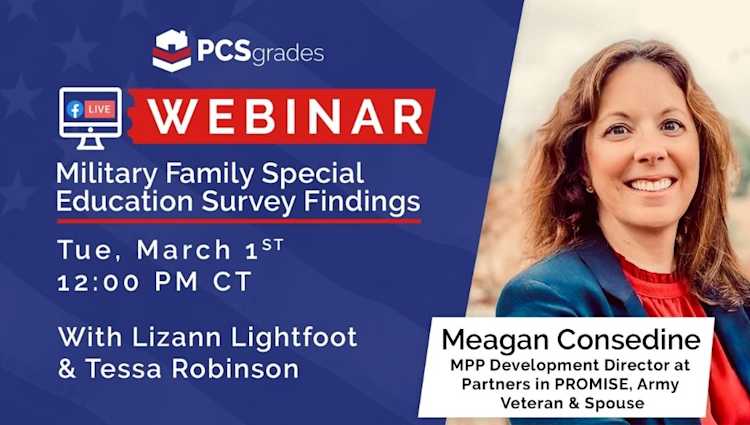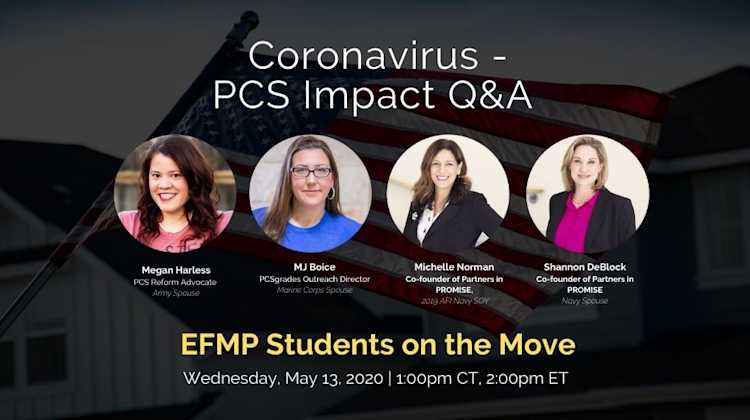Webinar: Military Family Special Education Survey Findings
by Lizann Lightfoot - March 18th, 2022

Our Guests:
Megan Consedine, Development Director at Partners in PROMISE. I’m a military spouse and veteran, and have two kids. We have navigated moves with a special needs child, which is what brought me to Partners in PROMISE. I love that this is a non-profit that advocates for military kids.
Crystal Mahaney, originally from Colorado, an Army spouse who has moved 8 times. We had kids after being married for 10 years, and our oldest was diagnosed with autism. We are on our 3rd state/ 4th school district, so I know it’s a struggle, and I relate to parents who are on the special education journey.
Watch the webinar here, to see the Military Family Special Education Survey results:
Partners in PROMISE has always been based on information from surveys, and data-driven findings. Last year’s survey showed that there was a lack of knowledge out there and often a delay in services. So this year’s survey dug a little deeper. We had responses from all DoD branches, and also the Coast Guard. Our mission is all about educating officials, and sharing the neuro-diversity of our kids with the broader military community. PCSgrades was a main sponsor for our survey, so thank you to everyone who completed this survey!
What are the key findings of the Military Family Special Education survey?
Megan: We had over 1,100 responses, which was more than double our prior responses, so this lets us analyze trends and see many responses from people who are mid-career, which aligns well with the timing of many children being diagnosed. The majority of responders were enlisted families, and most were located in the Continental United States (CONUS). The highest number of diagnoses were from the autism spectrum.
We focused on the following questions:
What impact does the highly-mobile military lifestyle have on the receipt of special needs services?
How familiar are military families with special education concepts?
What about the military lifestyle prevents military families from filing a special education complaint?
We grouped our findings into 3 areas: real, perceived, and unknown barriers to a FAPE (Free and Appropriate Public Education). This means a special needs child deserves an education plan that works for their unique needs, and this should be spelled out in an IEP (Individualized Education Plan).
What are real barriers to special education for military kids?
The real barriers that stood out the most were the actual delays in education, going from the time of a diagnosis to the time the child actually received special services or care. On average, families waited 23 months from the time of diagnosis to care. Rules vary by state, but federal law requires that care should be eligible within 60 days, and then received within 30 days after eligibility. The military family average was well above the expectation of 60-90 days, and sometimes was halfway through a typical PCS tour before the care was received. This was true across multiple states. The delays sometimes happen because of PCS moves, since families need to set up new appointments and recertify eligibility in each new state.
Crystal: In Texas, my younger son qualified for special education services, but when we moved to Fort Rucker Alabama, he was evaluated and found not eligible for special education services, and then when we moved again within the same town, the new school district found that he did qualify, so it was almost a 2-year gap between the time he received those special education services.
Megan: Children were most commonly diagnosed with autism, then ADHD. Children enrolled in the EFMP program were the most likely to receive services. Children who moved were the most likely to experience a delay. With each military move, children experience educational setbacks. 40% of our respondents who moved with an IEP already in place waited an average of 5-6 months before receiving care. This is compounded after every move, and this is the information we are presenting to legislative leaders, to let them know that these delays are widespread. Families have come to expect delays and this is almost normalized in our community.
Read more about EFMP students going through PCS moves here.
What does the Military Family Special Education Survey tell us about perceived barriers?
A perceived barrier impacts special education families, and how they advocate for their child. The good news is that only 25% of families chose to file a complaint. The bad news is that 75% of families chose not to file a complaint—either because they were planning to move soon, wanted to wait out issues at the current school district, etc. Either a positive or a negative experience can impact your reactions at the next duty station.
What are unknown barriers to special education for military kids?
Our unknown barriers had to do with how parents handled delays or lack of special education services. Many parents simply aren’t aware of resources or the systems, so some people end up paying out of pocket and are often less likely to have their child enrolled in EFMP. The MIC3 (Military Interstate Children’s Compact Commission) is designed to protect families, but there is sometimes a disconnect between the actual resources and the people who need them.
What should parents do when they discover a disconnect or failure in the resources their child needs?
Crystal: Our stresses are always compounded in military life, so this is one more thing we have to figure out on our own. There is a disconnect between installations and school districts. They are not reaching out to families, which creates a distrust between families and school districts. Parents have to educate themselves about federal laws and state laws, and we only have so much time at each location, so we need to be advocates for our kids--which is time-consuming, exhausting, and emotionally draining.
Partners in PROMISE wants to promote advanced advocacy for our families, so you can do certain things before you PCS, and then for the 6 months during the process of PCSing, so that the foundation is laid before we even get there. When we are better informed, we can get that care more quickly.
Megan: Currently, 33 states have approved advanced enrollment for special needs kids to prepare before they PCS by sending the IEP to the new school district in advance. But our survey found that many people didn’t even know about that option.
Another resource is the EFMP Systems Navigator who is a liaison or coordinator who can go with you to an IEP meeting. This has been in place for a while, and is installation-specific, so it is called different things for each branch. Many EFMP offices are understaffed, so be patient, but those resources are there and they are available at your incoming duty station. This is through the Community Services of the receiving installation. It’s not the same person you initially talk to when you enroll in EFMP.
Remember to communicate everything in writing when you communicate with a school. Even if you get a phone call, follow up with an email that summarizes it, so you have dates and summaries in writing. There are legal services available on base, so reach out to them to get the tools you need for your family.
Read more about what military families should know about EFMP services here.
What are practical tips for parents of special needs military kids?
Megan: Bring someone with you to IEP meetings. They can’t advocate for you, but they can listen in and add another set of ears to the conversation. Document everything in writing (see above for why that is so important). Know the state and federal laws that may be a little different for the timeline and parental consent. Ask for advance copies of IEP documents a few days before the meeting, so you can go through them in advance and prepare questions. Don’t remove any IEP goals without replacing them. Always ask for upgraded testing before agreeing to remove a goal.
Crystal: Contact your incoming school district--the director of special education. Tell them your situation, send a copy of the IEP or 504, because there may be specific classrooms that best suit your child. Keep an IEP binder with all the recent IEP evaluations, because this tells the school who your child is. Keep it organized so you know when the last evaluation was. Ask any teacher or administrator at the current school to write a letter about your child, which will explain what strategies have worked with your child, and where there are areas of challenge.
Where can we find all this information in one place?
On the Partners in PROMISE website, we have all this information under the Resources tab, and we also have family stories on that tab. Special education and our children are always unique and different, but there will be pieces of stories that speak to you. We have information about how to make an IEP binder. And there is a “Trust Your Gut” series where we talk with doctors and educators to learn about the beginning diagnosis stages of many conditions. Parent Training and Information Centers are required in each state, and there are dispute resolution processes too.
How were this year’s survey results different from previous years?
Megan: The delay in services really stood out to us this year. The 5.7 months delay--from PCSing to implementation of services--was definitely a unique finding.
Crystal: I think every parent asks at some point if they need an advocate or an attorney. It could be a professional, or someone who knows your child well. If your child is making little to know progress over a period of several months, or if you disagree with anything the school is proposing to do for your child, then that’s a good time to contact an advocate or an attorney.







